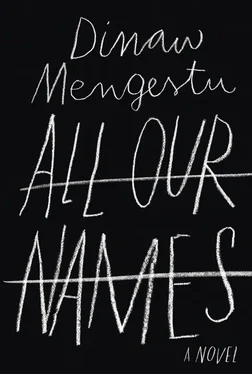We often think of the dead as ghosts who have the power to hover indifferently above us. My dreams of life in the capital weren’t so different; in those dreams I floated above life. Riding in that taxi was the same. I had the feeling I was gliding above the city, which was there for me to admire without my having to dirty my hands.
Isaac gave the driver instructions every few blocks. Our route was deliberately circular: we made unnecessary right and left turns when we could have just as easily gone straight. And just when the driver was growing angry, Isaac leaned across the front seat and threw two bills onto his lap. Soon we had come to another part of the city I had never been in before. The houses were new, each hidden behind a concrete wall that left only the roof and a few second-story windows visible. The bigger houses had their gates lined with barbed wire and shards of broken glass, and the last house on that narrow gravel road, where we finally stopped, had two men posted on the roof.
“Welcome home,” Isaac said.
More money was exchanged. I didn’t bother to see how much; it was more than what should have been paid, and I knew it didn’t matter. By the time we opened the doors to the cab, the gates to the house had been dragged open, and from behind them an almost elderly gray-haired man in a dark-blue uniform emerged to take my bags. His face and bearing reminded me of my father, who had been a soldier in the emperor’s army when the Italians attacked. His time in the military had lasted less than a year, and yet, like all the men who served with him, he was left with an unyielding devotion to the rigor of his military days.
That old man saluted Isaac before taking my bags, just as my father would have most likely done in his position. My father’s attachment to those codes had always struck me as foolish and at times embarrassing, but at least he wasn’t alone. There were other loyalists still out there.
Isaac nodded his head in return. We were nothing like them. They were a scarce and dying breed that, had I not been on crutches, I would have again gone running from.
For the next two nights, Isaac and I were the only ones who lived in that house. Guards came and went each evening without speaking to us. Every morning, a young girl with her hair wrapped in a white shawl brought food in a large pot and left it on a gas burner in the kitchen; we all ate from this pot, but who remained and who left, who cooked and watched over us, was never our concern.
In the morning, Isaac helped me from my room on the third floor, my arm draped over his shoulder as we wound our way down the uneven curved stairwell that was the most obvious proof of how quickly the house had been built. We had tea and coffee in the courtyard, next to a stone fountain that each afternoon attracted a steady flock of palm-sized golden birds who splashed and dipped their black beaks into the pool of water as long as no one was nearby. I waited for Isaac to explain to me what I was doing there and how he had become a part of that household himself, but it was clear by the time we had finished our first cup of coffee that he was in no rush to do so. He didn’t want to talk about politics or the people he was involved with. He didn’t want to talk about the money that had sustained him and had paid for my care and now my life, or what he had done to get it. He wanted to talk instead about all the places in the world that he hoped to see someday.
“I’d go to Egypt first,” he said. “I want to see those pyramids. Even if they’re not as great as people say, it was still Africans who made them. And then London, so I could see the queen. There are many things I’d like to ask her.”
He talked about Rome and Paris and New York. He had dreams of Hollywood and movie stars.
“They could use someone like me there,” he said. “I’m a great actor. I could be famous — I’m sure of it.”
I had had similar delusions while bandaged in the hospital. I had thought of America and Europe, but in vague, monumental ways, of towering buildings and white marble memorials. I’d imagined finding a foreign wife here in Africa who would take pity on my broken body, a doctor with blond hair and blue eyes who fell in love with me, though we came from opposite corners of the world and I had nothing to offer besides my poverty. Rescue — that is the true heart behind romance and fairy tale; the spontaneous love that frees us from the tower, hospital bed, or broken world is always only the means to that end.
We knew there wasn’t any chance of leaving that house, much less the capital and country, anytime soon. A large, empty house in which we were free to dream was as close as we were going to come to a different and possibly better life.
For those two days, Isaac and I lived in an increasingly magical world. We spent the bulk of our second day imagining ways we could improve the house. “A pool,” Isaac said. “Right here where we’re sitting. And more grass.”
“The stairs,” I said. “I’d tear them down and make them all the same height.” Isaac wanted to paint the house red. I suggested that gray was more appropriate, and for the next half-hour, we argued about colors. By the time evening came, we were down to wishing for more comfortable beds to sleep on, food that contained more than chunks of fat with a hint of meat attached to the ends — a bit of lamb for Isaac; a piece of chicken, preferably grilled, for myself.
We took our dinner into the courtyard. Isaac made a show of carrying our dinner plates from the kitchen, with a rag draped over one arm, one plate resting on the other. This was as close as we had ever come to eating in a restaurant, and since the impression was good enough, it made for one less thing to long for.
We ate quickly, the same bland mix of rice and withered vegetables that we’d eaten every day. When we finished, Isaac went back for more, but by the time he returned to the kitchen it was too late: the guards had already eaten the rest of the food.
“One last wish,” Isaac said. “It’s a simple one. I think even you’ll have to agree with me. I don’t want to go to bed hungry ever again.”
We raised our glasses of water and made a toast to that.
“To the end of hunger.”
“To the end of hunger.”
Before we went to bed, Isaac told me that tomorrow we had to be at our best: the men who owned the house were going to arrive in the morning.
I knew Isaac would be home by the time I reached his apartment. I was already a half-hour later than he expected. I had taken my time walking back to my car, and before parking near his apartment, I circled his neighborhood, looking for the car he had driven off in. I sped down his block in case he saw me through the windows, but I took the other dozen blocks slowly. An older white woman, who must have been one of the last remaining in the neighborhood, was sitting on her porch; she stared at me as I inched past her house, but as soon as she saw my face clearly, I knew she wasn’t worried: I was a young white woman in a used but respectable four-door sedan. I circled that block a second time, for no reason other than that I still hadn’t found Isaac’s car and was reluctant to give up my search until I did; the second time, we waved to each other as I passed.
I admit that, for the first hour, I loved playing detective. I now knew at least one of the reasons why David had followed me from the office. From the moment I saw Isaac get into his car, I had felt an irrepressible urge to smile, run, dance, jump, anything to put the extra energy I felt to use. He wasn’t the only one with secrets anymore; I had my own as well. I was a spy; in the parking lot I had actually lurked in the shadows.
I made a partial list of all my doubts about Isaac. If I had tried to name them all, the harmless fantasy of mystery and intrigue would have broken, and only the fraud would have remained. I played it safe and went for the obvious deceptions. I thought of his abrupt disappearance, his mystery trip across America, his spotless apartment, his car, and the single-page file at the office that revealed practically nothing other than that he existed. Taken together it could mean only one thing — he was a spy, or perhaps working undercover, which meant that the real question wasn’t who he was, but whom he was working for. Was he friend, or foe? I had a hard time deciding. There was something classically romantic about falling for the enemy — the risks were greater, and so were the odds against a happy ending. But I could see a possible happy ending if Isaac was on our side; I could be not only his lover but his confidante, and who could ask for a better cover than a woman like me? Adventure versus romance — not being alone won out every time.
Читать дальше












